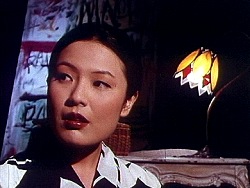
The Work of Bruce & Norman Yonemoto
The Work of Bruce & Norman Yonemoto
32 2nd Ave, New York, NY 10003
The Work of Bruce & Norman Yonemoto
32 2nd Ave, New York, NY 10003
The Work of Bruce & Norman Yonemoto
32 2nd Ave, New York, NY 10003
Works
Europe's enchantment with American consumer culture is depicted, as well-known European architectural landmarks. The Eiffel Tower, the Acropolis, and London Bridge are reflected in the glossy surface of a 1960's Cadillac convertible, the ultimate symbol of the "golden age" of American consumerism.
The ironic themes and strategies of the Soap Opera Series continue in this postmodern tale of artistic and sexual crises in Southern California. Boredom and alienation, the banality of fantasies and reality, and the need for idealized romance afflict the cliche-driven characters that wander...
This stylized narrative is the first in the Yonemotos' Soap Opera Series,in which they employ the traditional syntax and codes of melodrama to explore how mass media formulas manipulate desire and sexuality, fantasy and reality. Played out with the self-conscious acting and dialogue of a soap...
Writes Norman Yonemoto, "In the novella Blinky The Friendly Hen (1978), artist Jeffrey Vallance documented the supermarket purchase of a frozen chicken and its burial in the Los Angeles S.P.C.A. Pet Memorial Park. Naming the fryer Blinky, Vallance transformed poultry into pet, paying tribute to...
The final installment of the Yonemotos' Soap Opera Series uses the deadpan syntax of television melodrama to tell the story of Sumie, a young Japanese woman who marries an American surfer/filmmaker for the green card that will allow her to pursue her artistic career. Falling prey to the seductive...
Japan in Paris in L.A. centers on Saeki Yuzo, an early 20th-century Japanese artist who makes a pilgrimage to Paris to seek his artistic fortunes, only to confront ethnic and cultural differences. Around this narrative, the Yonemotos construct a multi-layered and self-reflexive work that foregrounds strategies of disjunction and contradiction. Intercutting archival footage of turn-of-the-century Paris with mid-century Los Angeles, this work is a complex meditation on issues of Modernity, representation, ethnocentrism, and identity.
Kappa is a boldly provocative and original work. Deconstructing the myth of Oedipus within the framework of an ancient Japanese folk story, the Yonemotos craft a highly charged discourse of loss and desire. Quoting from Bunuel, Freud, pop media and art, they place the symbology of Western...
Steeped in irony, Made in Hollywood depicts the personal and cultural mediation of reality and fantasy, desire and identity, by the myths of television and cinema. Quoting from a catalogue of popular styles and sources, from TV commercials to The Wizard of Oz, the Yonemotos construct a parable of...
Yonemoto uses the potato ("papa" in Quechua), which is indigenous to Andean Peru, as the starting point for his inquiry. Restaging Van Gogh's famous painting The Potato Eaters with a modern Andean Quechua family in place of the original's Dutch peasants, Yonemoto parodies conventional documentary "objectivity" and its discourses surrounding third-world agricultural misery. Footage of rural poverty from Bunuel's 1932 surrealist documentary Land Without Bread—itself a landmark parody of the documentary form—serves as an ironic counterpoint to the "real" family tableau.
The Yonemotos collaborated with performance artist Spalding Gray and actors Mary Woronov and Marshall Efron on this satire of the mythology of Los Angeles, juxtaposing a parodic fictional narrative with Gray's autobiographical monologues. The ironic re-enactment of the New York artist's encounter...
In this tour-de-force of stylized deconstruction, the Yonemotos rewrite a traditional narrative of desire: boy meets girl, boy loses girl. Employing the hyperbolic, melodramatic syntax of Hollywood movies and commercial TV, they decode the Freudian symbology and manipulative tactics that underlie...










